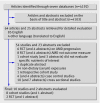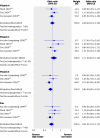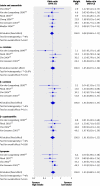Dietary antioxidants and primary prevention of age related macular degeneration: systematic review and meta-analysis - PubMed (original) (raw)
Review
Dietary antioxidants and primary prevention of age related macular degeneration: systematic review and meta-analysis
Elaine W-T Chong et al. BMJ. 2007.
Abstract
Objective: To evaluate the effectiveness of dietary antioxidants in the primary prevention of age related macular degeneration (AMD).
Design: Systematic review and meta-analysis.
Data sources: Search of seven databases without limits on year or language of publication, and retrieval of references in pertinent reviews and articles.
Methods: Two reviewers independently searched the databases and selected the studies, using standardised criteria. Randomised clinical trials and prospective cohort studies were included. Of the 4192 abstracts initially identified, 12 studies (nine prospective cohort studies and three randomised clinical trials) met the selection criteria and were included. Data extraction and study quality evaluation were independently reviewed, using standardised criteria. Results were pooled quantitatively using meta-analytic methods.
Results: The nine prospective cohort studies included 149 203 people, with 1878 incident cases of early AMD. The antioxidants investigated differed across studies, and not all studies contributed to the meta-analysis of each antioxidant. Pooled results from prospective cohort studies indicated that vitamin A, vitamin C, vitamin E, zinc, lutein, zeaxanthin, alpha carotene, beta carotene, beta cryptoxanthin, and lycopene have little or no effect in the primary prevention of early AMD. The three randomised clinical trials did not show that antioxidant supplements prevented early AMD.
Conclusions: There is insufficient evidence to support the role of dietary antioxidants, including the use of dietary antioxidant supplements, for the primary prevention of early AMD.
Conflict of interest statement
Competing interests: None declared.
Figures
Fig 1 Flow chart of study selection process
Fig 2 Pooled odds ratio for early AMD (highest v lowest dietary intake categories of vitamins and zinc)
Fig 3 Pooled odds ratio for early AMD (highest v lowest dietary intake categories of carotenoids)
Fig 4 Funnel plot of the odds ratio (for highest versus lowest intake categories) versus the standard error of the log odds ratio for studies evaluating lutein and zeaxanthin. Dotted line crosses the x axis at the estimate of the pooled odds ratio for early AMD
Comment in
- Primary prevention of age related macular degeneration.
Evans J. Evans J. BMJ. 2007 Oct 13;335(7623):729. doi: 10.1136/bmj.39351.478924.BE. Epub 2007 Oct 8. BMJ. 2007. PMID: 17923719 Free PMC article.
Similar articles
- Antioxidant vitamin and mineral supplements for preventing age-related macular degeneration.
Evans JR, Lawrenson JG. Evans JR, et al. Cochrane Database Syst Rev. 2012 Jun 13;(6):CD000253. doi: 10.1002/14651858.CD000253.pub3. Cochrane Database Syst Rev. 2012. PMID: 22696317 Updated. Review. - Antioxidant vitamin and mineral supplements for slowing the progression of age-related macular degeneration.
Evans JR, Lawrenson JG. Evans JR, et al. Cochrane Database Syst Rev. 2012 Nov 14;11:CD000254. doi: 10.1002/14651858.CD000254.pub3. Cochrane Database Syst Rev. 2012. PMID: 23152201 Updated. Review. - Antioxidant vitamin and mineral supplements for preventing age-related macular degeneration.
Evans JR, Henshaw K. Evans JR, et al. Cochrane Database Syst Rev. 2008 Jan 23;(1):CD000253. doi: 10.1002/14651858.CD000253.pub2. Cochrane Database Syst Rev. 2008. PMID: 18253971 Updated. Review. - Antioxidant supplements to prevent or slow down the progression of AMD: a systematic review and meta-analysis.
Evans J. Evans J. Eye (Lond). 2008 Jun;22(6):751-60. doi: 10.1038/eye.2008.100. Epub 2008 Apr 18. Eye (Lond). 2008. PMID: 18425071 Review. - Antioxidant vitamin and mineral supplements for slowing the progression of age-related macular degeneration.
Evans JR. Evans JR. Cochrane Database Syst Rev. 2006 Apr 19;(2):CD000254. doi: 10.1002/14651858.CD000254.pub2. Cochrane Database Syst Rev. 2006. PMID: 16625532 Updated. Review.
Cited by
- Macular pigment in ophthalmic practice; a survey.
Murray IJ, Hassanali B, Carden D. Murray IJ, et al. Graefes Arch Clin Exp Ophthalmol. 2013 Oct;251(10):2355-62. doi: 10.1007/s00417-013-2430-4. Epub 2013 Aug 4. Graefes Arch Clin Exp Ophthalmol. 2013. PMID: 23912797 - Age-related macular degeneration.
Ayoub T, Patel N. Ayoub T, et al. J R Soc Med. 2009 Feb;102(2):56-61. doi: 10.1258/jrsm.2009.080298. J R Soc Med. 2009. PMID: 19208869 Free PMC article. Review. No abstract available. - Mitochondrial reactive oxygen species promote epidermal differentiation and hair follicle development.
Hamanaka RB, Glasauer A, Hoover P, Yang S, Blatt H, Mullen AR, Getsios S, Gottardi CJ, DeBerardinis RJ, Lavker RM, Chandel NS. Hamanaka RB, et al. Sci Signal. 2013 Feb 5;6(261):ra8. doi: 10.1126/scisignal.2003638. Sci Signal. 2013. PMID: 23386745 Free PMC article. - The level and efficacy of lutein in patients with age-related macular degeneration: a comprehensive systematic review and meta-analysis.
Liu Y, Ni M, Wu R, Yang Z, Zhu X, Chen J. Liu Y, et al. Ann Transl Med. 2022 Mar;10(6):299. doi: 10.21037/atm-22-173. Ann Transl Med. 2022. PMID: 35433928 Free PMC article.
References
- Bressler NM. Age-related macular degeneration is the leading cause of blindness. JAMA 2004;291:1900-1. - PubMed
- Congdon NG, Friedman DS, Lietman T. Important causes of visual impairment in the world today. JAMA 2003;290:2057-60. - PubMed
- Van Newkirk MR, Nanjan MB, Wang JJ, Mitchell P, Taylor HR, McCarty CA. The prevalence of age-related maculopathy: the visual impairment project. Ophthalmology 2000;107:1593-600. - PubMed
- Mitchell P, Smith W, Attebo K, Wang JJ. Prevalence of age-related maculopathy in Australia. The Blue Mountains eye study. Ophthalmology 1995;102:1450-60. - PubMed
- Friedman DS, O'Colmain BJ, Munoz B, Tomany SC, McCarty C, de Jong PT, et al. Prevalence of age-related macular degeneration in the United States. Arch Ophthalmol 2004;122:564-72. - PubMed
Publication types
MeSH terms
Substances
LinkOut - more resources
Full Text Sources
Other Literature Sources
Medical
Miscellaneous



